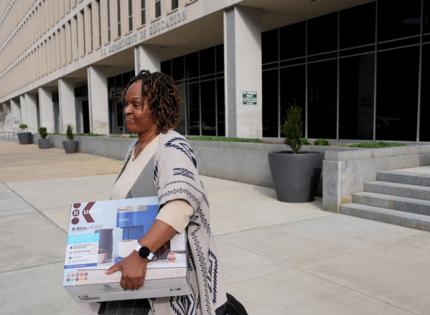Donald Trump's cuts are costing Black women their jobs
Published in Political News
When Black women rapidly disappear from the workforce, we are faced with more than a concerning statistic; their loss is a warning for where the country is headed.
Black women are the only population to experience a rise in unemployment in the last three months with rates spiking above 6%, twice the rate for white workers. Additionally, this does not capture the more than 500,000 that have yet to return to the labor force since the pandemic, making the real unemployment rate above 10%.
The cause of this recent rise is not a mystery. President Donald Trump and congressional Republicans have laid waste to the federal workforce, and the Department of Government Efficiency’s reckless job cuts have wiped out thousands of stable and middle-class jobs. True to these officials’ disdain for any mention of diversity, the people most directly affected by these job cuts are Black women, who, for decades, have depended on federal roles to support families and build economic security.
Federal employment is one of the few job sectors where Black women have had meaningful access to upward mobility, making up over 12% of the federal workforce— double their share of the labor force overall. The loss of their presence also means the loss of irreplaceable expertise, knowledge and skills that have benefited the entire American public.
Black women are the foundation and the heart of public service — processing veterans’ benefits at the Department of Veterans Affairs so those who served this nation aren’t left behind, guiding students through applying for financial aid from the Department of Education, protecting air and water at the Environmental Protection Agency, and coordinating disaster response at the Federal Emergency Management Agency when communities are in crisis. We hold the government together at every level, shaping policy and driving change, often without any recognition.
Economists maintain that Black Americans — particularly Black women — are often an indicator of economic shifts. When Black women start to lose jobs, they signal a crack in the entire economy.
The crisis we face is not limited to one community; we are barreling toward an economic tipping point fueled by the chaos of Trump’s agenda. Trump won on a promise to lower costs but has used his first six months in office to make life more expensive for everyday families and businesses. His disastrous tariffs have hit Americans hard, and now the Republican budget is slashing essential services, such as the Supplemental Nutrition Assistance Program and Medicaid, that protected our most vulnerable.
The impacts will be felt not just by Black women and their families. Already, consequences are reverberating through rural and urban communities as Trump’s Cabinet dismantles decades of progress, damages the futures of our children and hurts America’s economy, leaving a trail of destruction for future generations to clean up.
Illinois is choosing a different path — one that expands opportunity for all working-class families, including Black women. The JB Pritzker-Juliana Stratton administration, alongside partners and advocates across the state, has expanded investments and opened doors where others have slammed them shut. Our work has ranged from increasing investment in Black-owned small businesses, to strengthening the Equal Pay Act to make sure Black Illinoisans are paid fair wages, and ensuring working people can take up to 40 hours of paid time off to care for themselves and their families.
We are doing everything in our power to make Illinois the best state in the nation to live, work and raise a family without exception.
As Black women, we know what it means to work within, and against, systems that were never built for someone who looks like us. We know how it feels to do everything right and still be forced to carry the weight of a system that turns its back on us.
We want every Black woman in Illinois to hear this; Trump may be trying to erase the gains we’ve made, but he can’t erase us. Black women are the backbone of the economy — and when we lose ground, the whole nation feels the impact.
And this fight is not for us alone. Black women’s increasing struggles are an urgent clarion call to every person to stand up and speak out, for all our sakes.
____
Juliana Stratton is the lieutenant governor of Illinois. Cherita Ellens is the president and CEO of Women Employed.
___
©2025 Chicago Tribune. Visit at chicagotribune.com. Distributed by Tribune Content Agency, LLC.

























































Comments